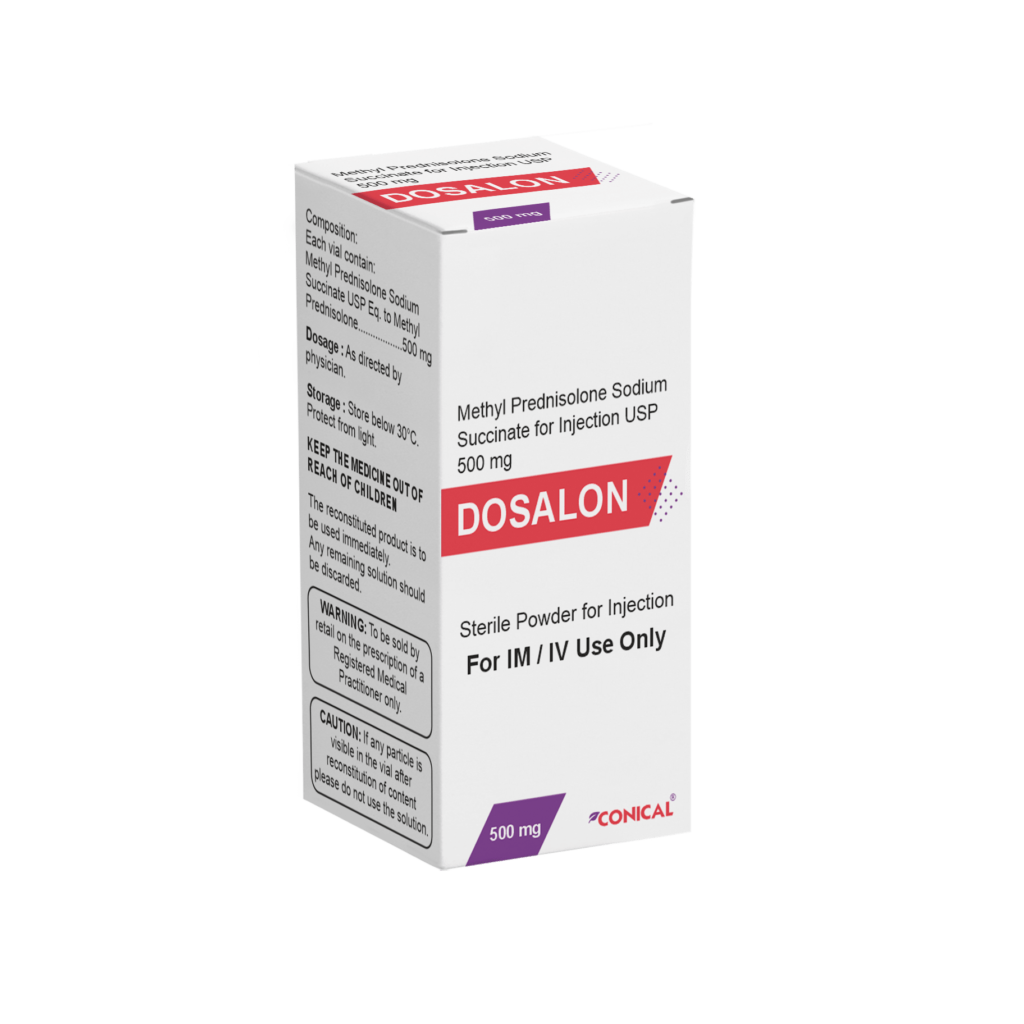







Healthcare providers indicate Methyl Prednisolone Injection for conditions requiring a rapid and intense corticosteroid effect, such as:
Important Precautions while taking Methyl Prednisolone Injection
Immunosuppressant effects/Increased susceptibility to infections
Corticosteroids may increase susceptibility to infection, may mask some signs of infection, and new infections may appear during their use. Chickenpox is of serious concern since this normally minor illness may be fatal in immunosuppressed patients. Measles can pose a more serious or even fatal risk for immunosuppressed patients. Therefore, the administration of live or live attenuated vaccines is contraindicated in those receiving immunosuppressive doses of corticosteroids. Consequently, healthcare providers must carefully evaluate a patient’s immune status before considering vaccination, as this decision can significantly impact patient safety and outcomes. Killed or inactivated vaccines may be administered to patients receiving immunosuppressive doses of corticosteroids; however, the response to such vaccines may be diminished.
Immune system effects
Allergic reactions may occur. Because rare instances of skin reactions and anaphylactic/anaphylactoid reactions have occurred in patients receiving parenteral corticosteroid therapy, appropriate precautionary measures should be taken prior to administration, especially when the patient has a history of allergy to any medicinal product.
Nervous system effects
Corticosteroids should be used with caution in patients with seizure disorders and myasthenia gravis. Severe medical events have been reported in association with the intrathecal/epidural routes of administration.
Ocular effects
Visual disturbance may be reported with systemic and topical corticosteroid use. Corticosteroids should be used cautiously in patients with ocular herpes simplex because of possible corneal perforation. Prolonged use of corticosteroids may produce posterior subcapsular and nuclear cataracts (particularly in children) and exophthalmos, or increased intraocular pressure, which may result in glaucoma with possible damage to the optic nerves. Frequent ophthalmic monitoring is necessary.
Cardiac effects
High doses and prolonged courses of glucocorticoids may cause adverse effects on the cardiovascular system, such as dyslipidemia and hypertension, which can predispose patients with existing cardiovascular risk factors to additional cardiovascular issues. Use systemic corticosteroids with caution and only when strictly necessary in cases of congestive heart failure. Also, use steroids cautiously in patients with hypertension.
High doses of corticosteroids may produce acute pancreatitis. When considering the use of systemic corticosteroids, healthcare providers must take particular care with patients who have the following conditions and should monitor them frequently: active or latent peptic ulceration, fresh intestinal anastomoses, abscesses or other pyogenic infections, ulcerative colitis, and diverticulitis.
Renal and urinary disorders
Providers should exercise caution with patients who have systemic sclerosis because corticosteroids, including methylprednisolone, increase the incidence of scleroderma renal crisis. Additionally, use corticosteroids cautiously in patients with renal insufficiency.
Under normal circumstances Methyl Prednisolone Injection therapy would be considered short‑term. However, the possibility of side effects attributable to corticosteroid therapy should be recognized, particularly when high‑dose therapy is being used (see section 4.4). Such side-effects include: Very common (≥1/10, ≥10%), Common ≥1/100 and <1/10, ≥1% and <10%), Uncommon ≥1/1000 and <1/100, ≥0.1% and <1%), Rare: ≥1/10,000 and <1/1000, (≥0.01% and <0.1%); Very rare: <1/10,000 (<0.01%). Not known (cannot be estimated from available data)
Infections and infestations
Opportunistic infections, Infections
Blood and lymphatic system disorders
Leukocytosis
Immune system disorders
Drug hypersensitivity, Anaphylactic reaction
Endocrine disorders
Cushingoid, Hypopituitarism, Steroid withdrawal syndrome
Metabolism and nutrition disorders
Metabolic acidosis, Sodium retention, Epidural lipomatosis, Fluid retention
Psychiatric disorders
Psychotic disorder (including mania, hallucinations, schizophrenia)
Eye disorders
Chorioretinopathy, Cataract, Glaucoma, Blurred vision
Cardiac disorders
Cardiac failure congestive, Arrhythmia
Respiratory, thoracic and mediastinal disorders
Pulmonary embolism, Hiccups
Gastrointestinal disorders
Peptic ulcer, abdominal distension, Oesophagitis, Pancreatitis
Musculo-skeletal and connective tissue disorders
Muscular weakness, Myalgia, Myopathy, Osteoporosis
Reproductive system and breast disorders
Menstruation irregular, Amenorrhoea
Contact us directly to receive full information on the product, the formulation, the science behind it, stability data, and more. Our Business Development Manager is a click away.
Questions are useful tools, they open lines of communication; give us information; improve interactions, facilitate analysis, and many more.
A pharma CMO is a special kind of an organization, offering contract manufacturing services to pharmaceutical companies for various kinds of drug formulations.
Reduce overall costs and time to market :
Contract manufacturers already have the needed infrastructure and technical staff, so working with a CMO or CDMO can decrease the cost of manufacturing your pharmaceutical products.
Scalability and flexible production capacity :
You can produce what you need when you need it without worrying about excess capacity. Additionally, CMOs understand the importance of quality and compliance, so you don't have to sacrifice safety for scalability.
Save on upgrading and maintaining equipment :
If you have your manufacturing facility, you’ll have to pay to upgrade your equipment as technology advances—which can get expensive. A CMO/CDMO’s only function is to make and distribute products, so part of their core business responsibility is to update their equipment whenever needed and perform maintenance.
Ease supply chain issues :
During the pandemic, there were several instances of supply chain issues, including medicine shortages. CMOs are generally better equipped than startups to handle a supply chain crisis.
Bandwidth to focus on core competencies
When your company resources aren’t directly allocated to manufacturing and distribution, you have more time to focus on other tasks, like marketing your new drug, researching, or working on drug discovery.
We have 7+ manufacturing sites with a minimum of WHO GMP certification and other country-specific approvals like NAFDAC approved, PPK Kenya Approved, TFDA Tanzania Approved, EU-GMP Approved.
We have below manufacturing capacity:
For Tablet, Capsule, and soft gel: up to 1 million units per shift
For Syrup: up to 0.05 Million per shift
For Ampoule and Vial: up to 0.1 million units per shift
For Ointment and Cream: up to 0.1 million units per shift
For Suppository: 0.1 Million units per shift
